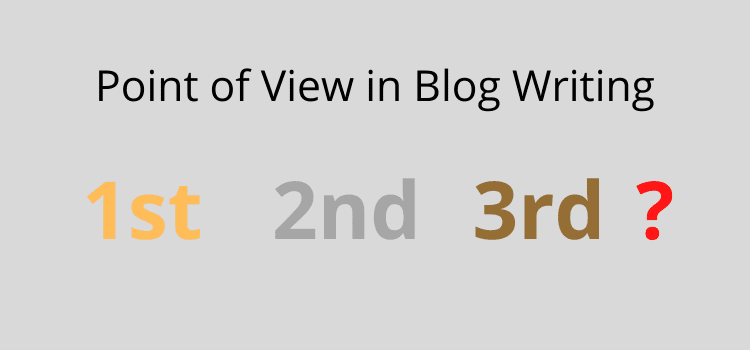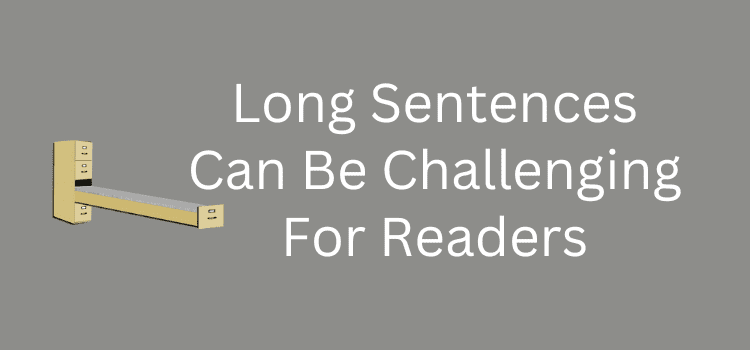
How do you select your point of view in blog writing? Do you write in the first person or second person? Can you use the third person?
So many new writers are now sharing their knowledge, thoughts, and feelings in their blog posts.
Blogging is a great way to connect with readers and hone your writing skills. Some write purely for pleasure, while others write in-depth articles for content marketing.
But no matter what you are writing about, what person or point of view should you use in a blog post?
Point of view in blog writing
Have you thought about these questions regarding your point of view (POV)?
What person should you use when you write blog posts?
Of course, there are many blogs written in the first person.
But is it better to write in the second-person point of view?
Or can you use the third-person perspective in blog writing?
The answers to these three questions are all yes.
But you need to know how, why, and when you should use each one.
It will depend on the context of your writing.
Let’s take a look at all three options and how you can use each point of view in blog writing.
Then you can choose the best one for your blog writing.
The first-person point of view

In this voice, your pronouns will include I, me, my, and mine.
You can use singular or plural forms by using we, our, and us.
A lot of new writers opt for this style without thinking much about it.
Often these are blogs written in the first person because it feels natural.
When you write in the first person exclusively, you are talking about your experiences and how they affect you.
Yes, you are sharing your thoughts and ideas.
But you are talking at and not to your blog readers.
It means that it will make it difficult for a reader to feel included in your writing.
This is especially true if you are giving advice.
If you are writing a series of posts about your personal memories, or even a memoir, yes, it works well.
But it tends to be a bit too much me, me, me.
The first person is also fine for social media.
But you should limit its use in blog writing depending on your target audience.
The second person point of view

When you write in the second person using you and your, you are including your readers.
It means that you are thinking about your readers and how they might react to your writing and ideas.
You might use it for a how-to or instruction post. Here is a quick example.
First, you need to download your software. Then, you can install it on your laptop. But don’t worry about the settings; because the default settings should be fine for what you need to do.
If you write the example above in the first person, it will read like this.
First, I needed to download my software. Then I could install it on my laptop. But I didn’t worry about the settings because the default settings were fine for what I needed to do.
You can see the big difference it makes. When you use the first person singular, you need to use the past tense because you are talking about an experience.
But if you use the second-person POV, you will naturally use the present tense to give helpful advice or instructions.
You can read more about using the second-person point of view in blog writing in my extended article on the topic.
The third-person point of view

When you use third-person narration, you are telling a story from a detached perspective. You use the pronouns he, she, and it, or they and them.
It is the storytelling tense, and it relates the thoughts and feelings of the characters in a story.
There are quite limited uses for it in blog writing unless you are relating a story.
The use of the third person, limited or omniscient, is generally associated with fiction writing and novels.
Excellent blog writing almost always comes from a personal perspective, which limits the possible uses of this point of view.
What is the best choice?
There is no single correct answer to the question.
In blog writing, you will find that you need to combine and mix your points of view within your posts and articles.
He is an example of combining points of view to help and involve your readers.
I often read articles written by Neil Patel on blogging and SEO.
If you haven’t heard of him, you might want to take a look at some of his informative articles.
In fact, he wrote a great in-depth article about using point of view in article content.
You can see that I have used all three POVs in the three lines of the example.
However, the main focus is on informing the reader and including a suggestion or advice that will be helpful.
Your choice will always depend on your writing style, your subject matter, and what you are trying to achieve in your writing.
But you can’t make a simple selection and decide on using the first, second, or third person in all your blog posts.
You will always need to mix and match for different situations.
Think about your reader
In any form of writing, you should have your readers in mind.
If you think about how you can help them, you will tend to use the second person POV more and more.
That’s not to say that you will use it for every sentence in an article.
But anytime you can change from the first to the second-person perspective, you will talk to your readers and not at them.
I always think that this is the best approach to have in mind.
You can experiment and see what works best for you.
Don’t forget that you can check some of your earlier posts to see if you can improve them by making changes and edits.
Summary
You might not have thought about the aspect of point of view in blog and article writing before.
Yet, it is a vital component and a powerful tool you can use to improve and polish your writing and attract new readers.
Yes, there are blogs written in the first, second, and third person.
But whenever and whatever you write, choose the best one for your readers.
Take the time to make decisions about your point of view use. You will be thinking about how your readers are going to relate and react to your writing.
So yes, POV is a powerful tool to have in your writer’s toolbox.
Related reading: Should Writers Fear AI? No, But You Need To Adapt
Share This Article



Insightful. Had this information at the right time. Thank you for sharing your understanding. It really helped.
Thanks for the tip. I found it very informative.
This helped me. And each and everything was well explained.
This is a great article and helpful. I was struggling with deciding how to write my blog. I do find myself going back and forth with first and second person in one article which lead me to search and find this article. Is it bad to have some of both in an article? I think between the two, I would end up choosing first person as I really want it to be personal.
Thank you! This was some of the best help I have received to date. I am 67 years old, retired from my 38-year career as an Executive Director, and I am considering writing my first “something”! Although I only read third person books, I plan to write this in 1st person, because the topic is from my personal experience. Can you give me an idea of how much money I can expect to pay from start to finish? Thank you in advance for any advice you can give me.
Very thoughtfully written. I’d say surprisingly so. And very helpful. I have a blog and am being challenged to use ‘I’ less. Not an easy proposition for me, and something I’m not sure I need to do. But this article has challenged me to think twice about that.
I write all my fiction in third person and all my non-fiction in first person. It’s just what feels natural to me. My blog has only one non-fiction article, which means there’s a lot of third person on my site.
Yes, I am very comfortable writing in the first person. It just makes sense to me and I think I do it without even thinking about the consequences. LOL I see your point, however, and will make efforts to change this when necessary? Do you really think a rewriter is necessary though?
A rewriter is just one choice of many online tools to help your writing. Necessary, no. It’s up to you to choose writing tools that are going to help you the most.